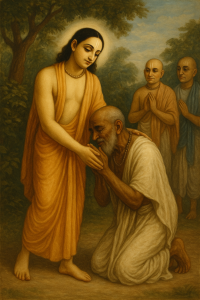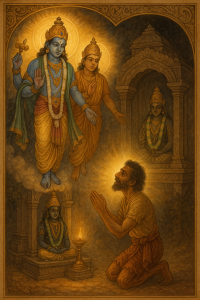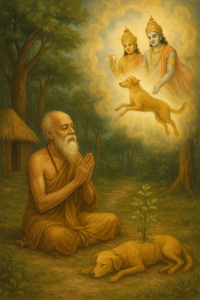In a village once famed for its scholars and ritualists, there lived a brāhmaṇa who had been born into a noble and learned family. In his youth, he had studied the Vedas and sacred texts. But over time, pride crept into his heart, and gradually, he fell from the path of dharma.
He began to accept money for rituals, manipulate others using his scriptural knowledge, and live only for sense enjoyment. Eventually, he abandoned even his duties, associating with the sinful and mocking those who lived a simple, devotional life.
As old age came, his body weakened, and his mind grew fearful. Still, he did not return to the path of righteousness. Then, struck by illness, he became bedridden and knew his end was near.
At this time, a wandering sadhu came to the village and heard of the dying brāhmaṇa. Moved by compassion, he came to his side and softly spoke the names of the Lord:
“Govinda… Mādhava… Hari… Nārāyaṇa…”
Though the brāhmaṇa had spent his life in neglect of bhakti, hearing these names stirred something deep within him. With difficulty, he opened his eyes and whispered:
“Hari…”
And with that single word—his last breath left his body.
At once, the air changed. Two groups of celestial beings appeared: the Yamadūtas, ready to take the soul to face punishment, and the Viṣṇudūtas, bearing symbols of the Lord, glowing with divine radiance.
The Yamadūtas argued, “This man lived a sinful life, abandoned his duties, and offended sacred traditions. He must face the consequences.”
But the Viṣṇudūtas replied:
“Yes, he fell. But in the final moment of life, he uttered the name of Hari—even once, even faintly, even after a life of sin. That alone is enough. As stated in śāstra, the name of the Lord burns all sins, and anyone who chants it, knowingly or unknowingly, is purified.”
The Yamadūtas, unable to refute this truth of bhakti, were forced to depart.
The soul of the brāhmaṇa, now glowing with newfound light, was taken by the Viṣṇudūtas to Vaikuṇṭha, where he was given the chance to begin eternal service to the Lord, free from material bondage.
Lessons from This Story:
- The name of Hari, even uttered once at the time of death, delivers the soul.
- The Lord forgives lifetimes of sin when one surrenders in the final moment with sincerity—even if delayed.
- Viṣṇudūtas protect those who turn toward the Lord at the time of death.
- As the Padma Purāṇa and Bhāgavatam affirm: “ante nārāyaṇa-smṛtiḥ” – Remembering Nārāyaṇa at the moment of death guarantees liberation (SB 2.1.6).



